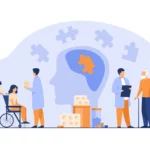
Lewy Body Dementia Diagnosis: Now what do I do?
This post may contain affiliate links or Google Ads and we may earn a small commission when you click on the links at no additional cost to you. As an Amazon Affiliate, we earn from qualifying purchases. This is at no additional cost to you and helps with our website expenses.
Now what? This is a question that many people face after they are diagnosed with Lewy Body Dementia. It can be overwhelming, and it is important to take things one step at a time. There are many things to do after a Lewy Body Dementia diagnosis, including preparing important documents, looking into long-term care facilities, and speaking to a financial advisor. The most important thing is to care of yourself and your loved one during this difficult time.
Prepare Power of Attorney Documents after a Lewy Body Dementia Diagnosis.
If your loved one is in the beginning stages and still comprehends most things, you should be able to get a Power of Attorney (POA) for them. If they are in more advanced stages it may not be possible for them to sign this document.
Lewy Body dementia is a progressive disease that can have a profound impact on a person’s cognition and ability to function. One of the best ways to prepare for the possibility of losing the ability to make decisions is to create Power of Attorney documents. This allows them to designate someone else to make financial and medical decisions on their behalf if they are no longer able to do so.
It is important to have this conversation as early as possible after receiving a Lewy Body dementia diagnosis, as the disease can progress rapidly and may soon render a person unable to sign such documents.
Home Adaptations after a Diagnosis
If you have a loved one who has been diagnosed with Lewy Body Dementia, there are a number of home adaptations that you might need to consider. These can include ramps, to make it easier for them to get in and out of the house; bathroom accessibility, to ensure that they can safely use the facilities; and grab bars, to help them move around the home without falling.
Each person’s needs will vary, so it’s important to consult with a medical professional or occupational therapist to determine what home adaptations would be most beneficial for your loved one. By making these changes, you can help them to maintain their independence and live a more comfortable life.
Look into Long-Term Care Facilities or Memory Care
You might be planning on keeping your loved one at home the entire time. Many people do. But others find it impossible to do. Your loved one might become combative, you can’t handle the daily duties because of your own lacking of physical capabilities, or there are certain things you just can’t do. Some people draw the line at when they become incontinent, or frequent falls happen and you are not able to lift them. It’s an individual choice.

But don’t rule out that at some point you might need help from a facility and your loved one will need to be placed.
Long-term care facilities or memory care units can provide the specialized care that Lewy Body Dementia patients need. These facilities can help patients with activities of daily living, and they also offer social and recreational activities. Memory care units have staff members who are trained in dealing with dementia, and they can create an individualized care plan for each patient. If you or someone you know has Lewy Body Dementia, it is important to consider long-term care options.
Inquire about Home Health Aides after a Lewy Body Dementia Diagnosis
Lewy Body Dementia comes with a range of symptoms that can make everyday tasks difficult, if not impossible. Home health aides can be a valuable resource for those dealing with Lewy Body Dementia. These aides are trained to provide assistance with activities of daily living, such as bathing, dressing, and toileting.
They can also offer much-needed companionship and help with transportation to doctor’s appointments and other outings. If your loved one has been diagnosed with Lewy Body Dementia, be sure to inquire about home health aides. They can provide essential support and make coping with this disease a little bit easier.
Adult Day Programs are a Wonderful Way to Provide Socialization and Cognitive Help
Adult day programs provide socialization and cognitive help to those who need it most. These programs are designed to meet the needs of adults, including seniors, who may be experiencing social isolation or cognitive decline. Adult day programs offer a variety of activities that can help participants stay engaged and connected with others.
In addition, adult day programs can provide cognitive stimulation and help to slow the progression of cognitive decline. Adult day programs are an important resource for many people with a dementia diagnosis, and they can play a vital role in promoting health and well-being.
Take Time to Care for Yourself
Being a caregiver can be one of the most rewarding experiences of your life. You get to help someone you love through a difficult time and be there for them when they need you most. However, it’s also a demanding job that can take a toll on your physical and mental health. It’s important to take care of yourself so you can be the best possible caregiver for your loved one.
Make sure to schedule time for yourself every day, even if it’s just a few minutes to go for a walk or listen to music. Get out and socialize with your friends on a regular basis, and don’t hesitate to talk to a therapist if you’re feeling overwhelmed. Taking care of yourself is crucial if you want to be able to care for someone else.
Discuss the Lewy Body Dementia Diagnosis with your Family and Friends
The diagnosis of Lewy Body Dementia can be difficult to discuss with friends and family, as it can be a sensitive subject. However, it is important to share what you can with those closest to you. It is important to remind them that the disease affects their brain and they cannot control their actions or symptoms. Explaining the disease as best you can can help loved ones better understand and support your loved one.
You may also want to consider attending a support group together, where everyone can learn more about the disease and connect with others going through similar experiences. It is also crucial to discuss the diagnosis with children and teenagers in the family, as they need to understand what is happening and how they can best offer support. Ultimately, communication and honesty are key in discussing Lewy Body Dementia with friends and family.
Speak to a Financial Advisor to get all of your Matters in Order
When faced with a medical diagnosis, it can be easy for finances to fall by the wayside. However, it is important to take the time to consider your future care needs. Are all of your bank accounts and assets properly organized? Are you listed as an owner or signer on everything? Do you need to set up a trust? If you are worried about not being able to afford long-term care, it may be worth talking to a financial planner or attorney about a Medicaid spend down.
These steps may not be pleasant to think about, but they can help alleviate stress and ensure that your financial needs are taken care of in the case of an emergency. Don’t let the burden of finances add additional stress during this already challenging time – make sure you take the necessary steps to protect yourself and your loved ones.
Start an Exercise Program for Your Loved One
When it comes to managing Lewy Body Dementia, doctors and physical therapists all agree on the importance of staying active and having an exercise routine. Studies show that exercise can have a positive impact on symptoms such as balance, muscle strength, and physical function.
If you or your loved one with LBD are looking for some guidance on where to start with exercise, the American Parkinson’s Disease Association has you covered. They offer a variety of exercise videos online that are specifically designed for those with Parkinson’s disease and LBD. Staying active is vital for managing LBD and improving quality of life, so be sure to check out the APDA’s resources and get moving.
Living Will and Advanced Directives after a Lewy Body Dementia Diagnosis
It is important to have Living Wills and Advanced Directives in place. These documents outline a person’s wishes for their medical care, including end-of-life decisions such as life support and pain management. This ensures that their preferences will be followed in the event that they are unable to communicate them themselves.
It is also important to review and update these documents regularly, as circumstances may change and a person’s wishes may evolve over time. If your loved one is able to participate in this process, consider discussing it with them and incorporating their input into the documents. Taking the time to prepare or update these important papers can bring peace of mind to everyone involved.
Is your Loved One a Veteran?
Are you the caregiver of a Veteran? Did you know that the Department of Veterans Affairs offers support for you and your family? Whether your Veteran is disabled or not, the VA can provide a variety of resources to help ease your load. These services range from supplying home health aides and durable medical equipment, to even covering expenses for caring for your loved one.
The best place to begin navigating these options is by connecting with your Veteran’s social worker at the VA. So don’t hesitate to reach out and see what assistance is available for you and your Veteran family member. Caring for a loved one can be overwhelming, but remember that you are not alone in this journey – the VA is here to support you every step of the way.
Conclusion. A Lewy Body Dementia diagnosis can be tough to handle. But if you take the right steps and seek out the best resources, you can make life with Lewy Body Dementia much easier. From connecting with support groups to planning for future care, these tips will help put you on the right track. If you have any questions or need more information, please don’t hesitate to reach out to us. We’re here to help in any way we can.




